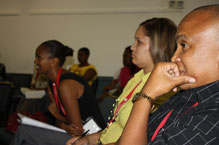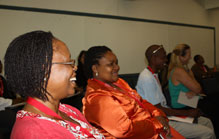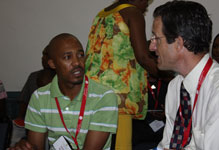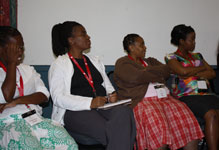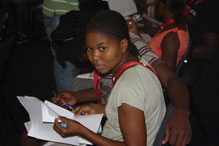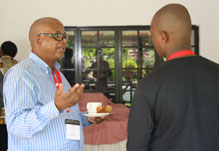
Community Capacity Enhancement trainer Tom Mkhize explains some of the finer points of the methodology during lunch
February 3, 2010 – Since 2008, the Nelson Mandela Foundation has been using the Community Capacity Enhancement (CCE) methodology as the basis for its community conversations and has trained a cadre of facilitators from the community in this methodology.
As part of its commitment to provide the communities it works in with sustainable solutions to the problems they face, the Foundation opened this year’s CCE training, aimed at issues surrounding HIV/AIDS, for new facilitators to other stakeholders interested in the methodology.
The stakeholders included the Department of Health, the Nelson Mandela Children’s Fund, the Tshepang Trust, HOPE worldwide, the South African Council of Churches, Reos Partners, AIDS Foundation of South Africa and the I Can Foundation.
Attending the training as observers were: Gudrun Otto from GTZ – an international co-operation enterprise for sustainable development and the main supporters of the Foundation’s community conversations; Dr Catherine Sozi – the UNAIDS Country Co-ordinator; Dr Marc Aguirre, representing HOPE worldwide; and Dr Kgosi Letlape from the Tshepang Trust.
The training is being held outside Johannesburg and started on Monday, February 1. Training will end after a refinement process (with existing Foundation facilitators) on Monday, February 8.
“We have these organically grown partnerships with, among others, the South African Council of Churches, which do wonderful work and have seen the potential in having a methodology to frame their work,” said the Foundation’s Dialogue Project Manager Naomi Warren. “So they’ve come here to learn about the CCE methodology.
“From our perspective, it’s really great. We tend to go into a community and provide that community with the tools, but then it’s up to those communities to implement those tools. Slowly, more and more stakeholders are becoming interested in building relationships with local communities. As a result, they are able to strengthen their communities to address the concerns identified around HIV/AIDS.
“The whole programme is becoming more sustainable,” said Warren.
The CCE methodology, as the name suggests, helps build capacity in communities to deal with the challenges those communities face.
“This year we’re focusing more on this programme becoming sustainable,” said Mothomang Diaho, Head of the Foundation’s Dialogue Programme. “We’d like to see this programme go beyond the Nelson Mandela Foundation, becoming rooted firmly within communities, and being owned by them. We want to have more partners, including government, faith-based organisations and non-governmental organisations, getting involved in the work and becoming involved as part of this year’s process.
“As it is, there are organisations already implementing work independently of the Foundation beyond the initial conversations. The long-term vision is to provide technical support for the methodology, handing over the implementation to partners.”
Lesley Nkosi, Chief Facilitator on the CCE community conversations programme, said: “CCE as a solution approach assumes that the communities have the wisdom to change the direction of HIV in their own communities and encourages this wisdom to be used to turn things around.”
Aguirre said getting communities to find solutions to their own problems is the key to tackling the pandemic, and that the CCE methodology is ideal to help communities build capacity to do this.
“Understanding that communities have capacity to meet their own challenges is fundamental to a scaled-up response to HIV,” said Aguirre. “It’s something that’s often forgotten in terms of finding solutions. If we don’t promote the role of the community, we can’t find solutions.
“Today I’m here with some of my colleagues to see if we can find a way to walk together on this journey and promote this methodology.”
Speaking at the beginning of the training, Diaho said that 2010 marked “29 years since AIDS was first reported”.
“We need to shift the trajectory,” said Diaho. “We have to engage communities. AIDS-related illnesses kill more people than any other infectious disease, and even if we reduce the prevalence we will still be dealing with the effects of this epidemic for a long time to come.
“Supporting and building capacity in communities affected by the epidemic is absolutely essential; you are the front line of change.”
